Published on Jan 24, 2022
We have now been living through the COVID pandemic for almost two years. All through this crisis, we have seen that students in our country are treated differently depending on their demographics. White students in wealthy districts are more likely to be given support and multiple chances to succeed, while too often Black and Latinx students are disproportionately given failing grades.
Image

Here is what we know, from UChicago Consortium research as well as sixteen years of school improvement work: when we give a 9th grader an F, the message they receive is that they don’t belong in their new school and that their teachers don’t care about them. Each failure impacts their long-term academic outcomes, making them less likely to graduate from high school. We know that failing grades have similar effects on older students as well.
We have to seriously consider the harm we will do by failing students, especially in this context. The last year of continuous school for current ninth graders was in sixth grade. They are navigating adolescence, which is always challenging, and now they are doing so while managing the recent school closure, continuing social isolation, grief, and constant acts of overt racism and racial violence by perpetrators who are not often held accountable.
We at NCS see all of you, teachers, counselors, and principals, in our schools working hard in the midst of this ongoing crisis. We know you are striving valiantly to support students. We see and celebrate these practices:
Teachers are supporting students to achieve high grades by giving them multiple opportunities to demonstrate what they have learned through opportunities to revise work and retake assessments. Teachers are also rethinking the impulse to cover the entirety of their pre-pandemic curriculum in favor of deeper learning on what’s most important and grading with empathy for students.
Counselors are reaching out to students to re-engage them in their classes and re-connect them to school, while also making sure their social and emotional needs are being met.
Principals are creating the conditions in schools for teachers and counselors to have the time and resources to support students and the flexibility to make decisions in the best interest of students’ success.